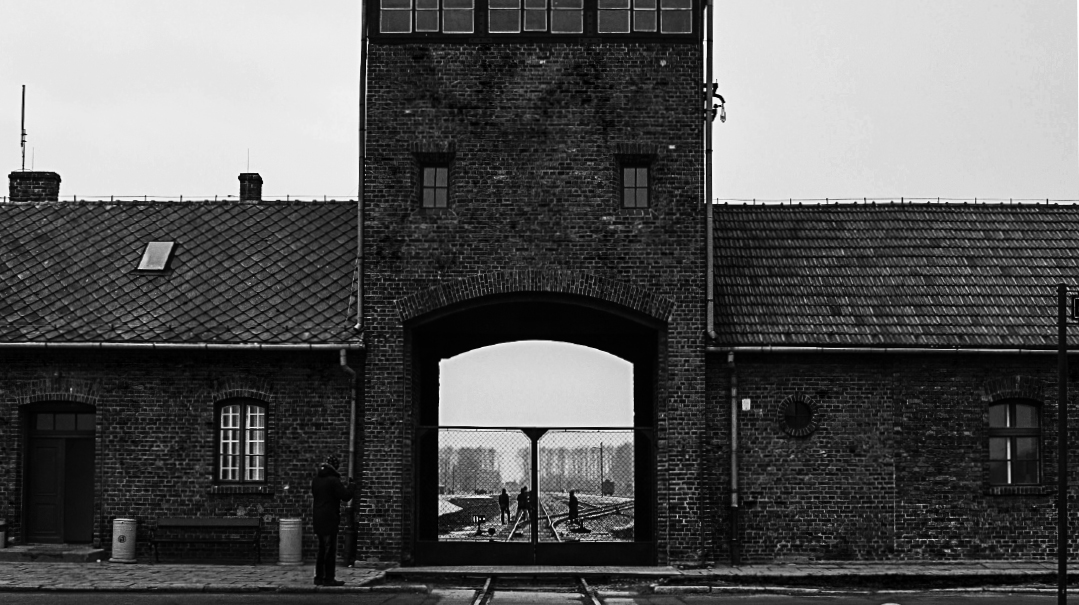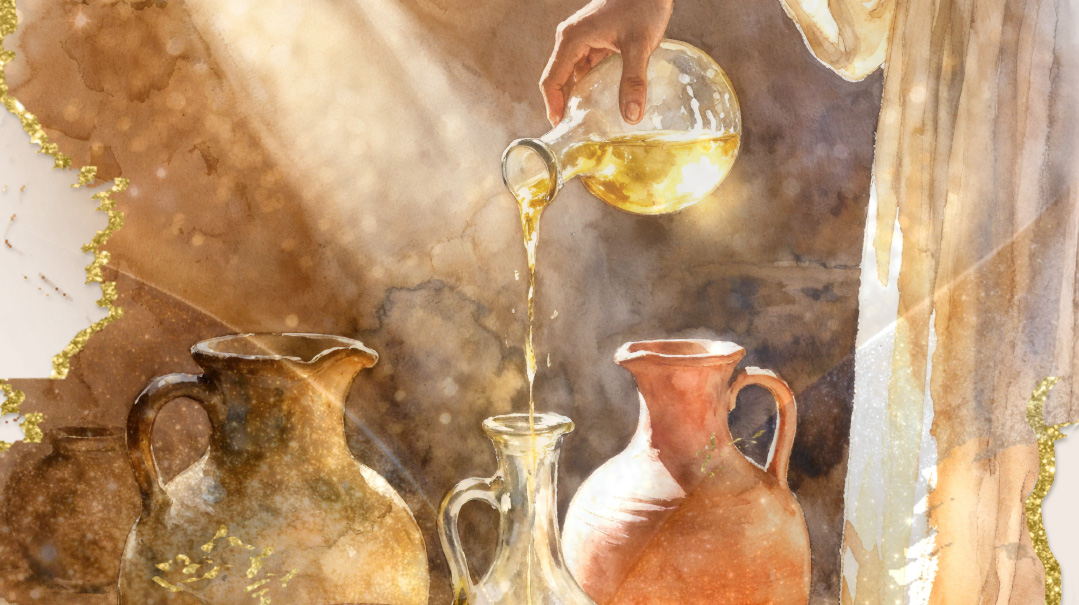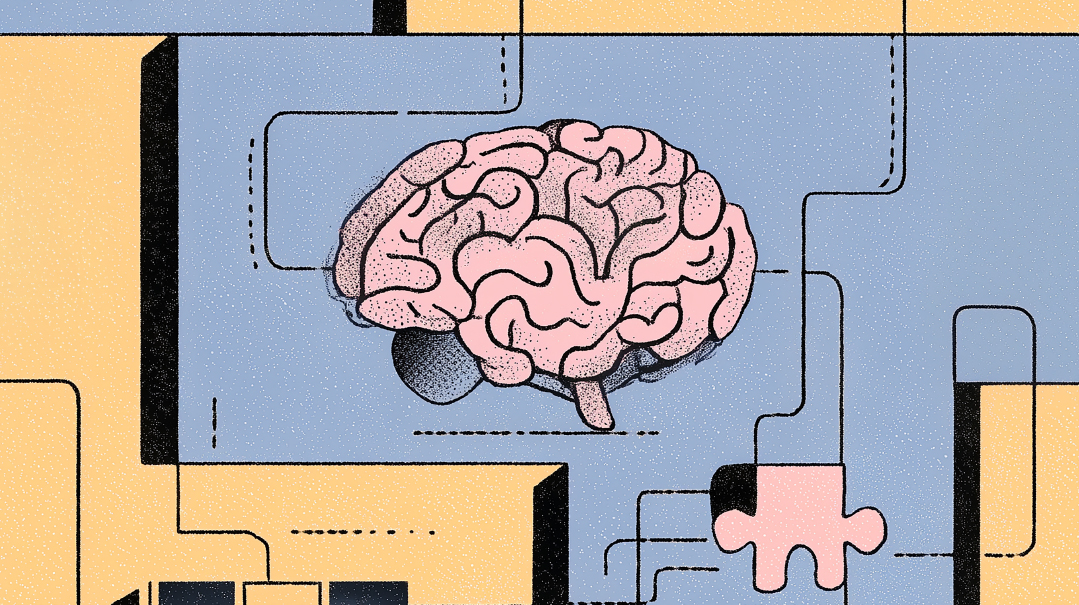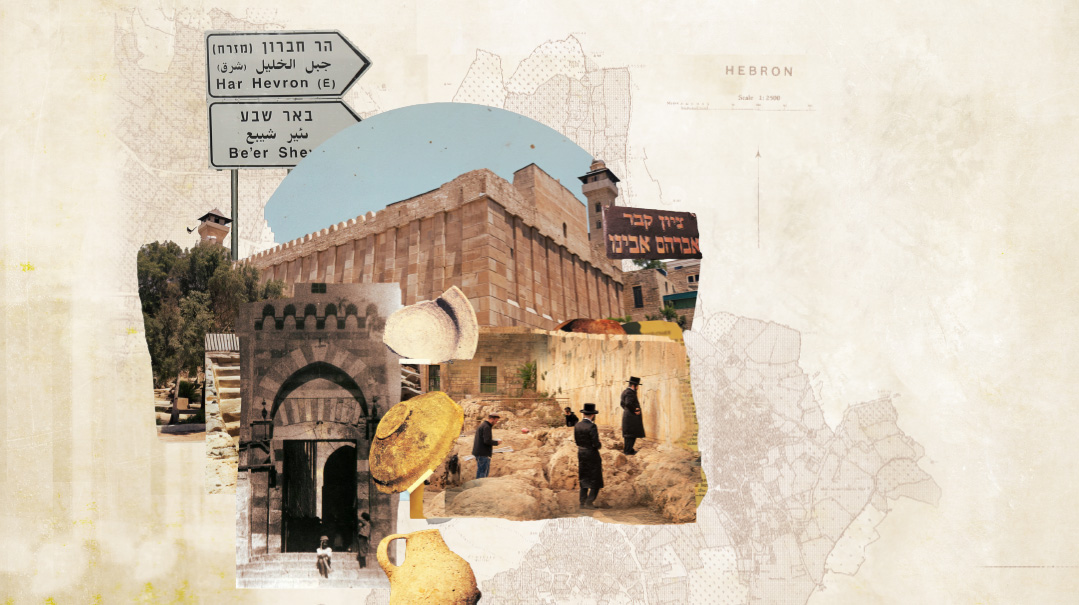A Thousand Miracles
| August 6, 2024Mrs. Mindu Hornick attributes her unlikely survival to, “Miracles, only miracles”

As told to Riki Goldstein by Mrs. Mindu Hornick
Mindu was 13 years old when she was deported to Auschwitz. Ultimately, she survived a ghetto, a concentration camp, a slave labor camp, a Death March, and a train bombing, and rebuilt her life in England after the war. She attributes her unlikely survival to, in her words, “Miracles, only miracles”
I attribute my survival of the Holocaust to a thousand miracles. How else is it possible that a slim, sheltered 13-year-old Jewish girl lived through the torture of life in Auschwitz and survived as a slave laborer under demonic overseers? Miracles, only miracles. And I attribute what I have managed in the rest of my life to the strength I gained in the concentration camps. When you have been through that as a youngster, you learn to do whatever you need to do to survive.
Before the War Began
I
was born in a very small Jewish community called Vermeziv, in Czechoslovakia. It was very Orthodox, very frum. We baked challos at home on Friday, and since we had an oven, all the neighbors would put their cholent there and come collect it on Shabbos morning after shul.
Until World War I, Vermeziv was part of the Austro-Hungarian Empire. Post World War I, we were absorbed into Czechoslovakia, and in 1939, once invaded by Germany, the Germans gave our area back to Hungarian Regent Miklos Horthy.
When you live on such a volatile border, you get accustomed to learning new languages. In my case, I spoke German, Czech, and Slovak, and once our area was annexed to Hungary, I learned Hungarian in school. Later, in the concentration camps, my Hungarian was the one thing that blossomed, as there were lots of Hungarian girls there.
Horthy cooperated with the German Reich. Within a year of becoming part of Hungary, all the Jewish men of Vermeziv were gone. They were recruited to labor battalions, sent ahead of the Germans to dig trenches and load trucks. So my father, a wood and hay merchant, was taken away, wearing an armband with the star of David, forced to wield a shovel for the Germans.
I was 12-and-a-half when he left us, and I had an older sister and two little brothers. My mother must have been very resourceful because she somehow was able to feed us. We had a lovely home with a vegetable garden and an orchard, and she bartered our produce to get flour to bake bread and challah.
A year later, in 1942, they cleared out all the Jews of our town, except for eight families. We watched in horror as our friends and neighbors, and my grandparents, were loaded onto open trucks in the town center. Horthy had some say in these deportations, and apparently at his order, those families who had a member in the military were left behind. The trucks drove off to Galicia. We heard later that the Jews were ordered to undress, dig trenches, and were shot.
It was a miracle that we were left untouched, at home, at that time. But still, it was very frightening and isolating. Our father was taken away, our little town almost deserted, and our own fate unknown. The gentile neighbors, who we’d had good relationships with, were suddenly hostile.
Deportation to Auschwitz
WE
stayed with my mother in Vermeziv until Himmler decided that no Jews should be left in Slovakia at all. This was 1943, and one day, we, too, were ordered to come to the town square and climb onto those trucks: this time, they went to Košice, the regional capital. A section of the city had been allocated for a Jewish ghetto, and there we joined the Jews who had been crowded in.
I remember my mother had brought along some of the preserves from her storage cupboard, the fruit jams she’d made from our beautiful orchard. We ate them there in a loft in the Košice ghetto. I suppose there were some rations given out to keep the Jews alive, too; I don’t remember.
It took a few weeks until they took us to the railway station and started loading us up onto those cattle trains. My mother, my sister and me, and the two little boys, got on, and then people continued to be crammed in and crammed in until you could barely breathe. We were near the door of the cattle car, so we had a tiny slit between the planks for air. In the middle of the carriage there were two buckets. One had water, and one was a toilet. No room to sit, hardly room to stand. I don’t remember any men on the transport, because they had long been taken away; just mothers and children and babies. The babies were crying, but after a while, they stopped. They just died.
We weren’t being taken that far, but because the railways had been damaged, the train had to be shunted back and forth, and we were on it for three days and three nights with no idea where we were.
Maybe my mother had heard of the concentration camps but never told us? In those days, it was always, “Don’t tell the children.” I was just 13, my sister 15, so we knew nothing at all of Auschwitz.
When the train stopped, my mother said to me, “Have a look where we are.” Through that crack by the door, I read out to her, “Oświęcim.”
“I have never heard of it,” my mother said.
Suddenly, with a terrible clanging, the doors of the train opened. A Jewish man (called a kapo, I later found out) came on board. The Germans didn’t actually do the work of unloading the trains; the kapos did it. Seeing my mother, he spoke to her quickly in Yiddish: “Velche zenen deine kinder? — Which are your children?” My mother pointed out the four of us.
“Let the girls go ahead, you will see them later,” he said to her.
My mother agreed to do as this kapo said. Although a total stranger, he was very persuasive, and the Yiddish gave my mother the confidence to trust him.
He dragged us down from the carriage, urgently thrusting more words at me and my sister. “You say you are seventeen,” he said to me. “You say you are nineteen,” he said to her, and then, “Du bist a schneiderin — You are a seamstress.”
“Go,” my mother said.
Alive in the Inferno
I held my sister’s hand, and we walked. Looking back, we saw my mother’s spotted scarf, and we waved to her. Through the milling crowd, we could not see the little boys.
Ahead was a huge arched gate with the words “Arbeit Macht Frei,” and we followed the crowds through. It was a sight that will stay with me forever, one which you could not possibly imagine if you were not there. German soldiers with guns shouted orders. At the watchtowers, more soldiers waited with machine guns. Emaciated people walked aimlessly around, their bodies nothing more than skeletons.
We realized that the majority of the crowd, mothers and children, were being sent to the left side; a few to the right. The shock of our arrival was such that to this day I do not remember anyone asking my age or profession, but years later, through Yad Vashem, I got a paper with my name, Klein, Mindu, 17, schneiderin, so I must have said what the man told me to say.
We were pointed to the right.
There were shouts of a word that sounded like “Rier! Rier!” We didn’t know what it meant, but slowly we realized it meant a line of five people abreast, so we got into that formation with everyone else.
We were marched to the washhouse, told to strip, had our hair shaven. We were told to place our clothes neatly, so we would find them, but when we came out of the showers where we’d been sprayed with disinfectant, our own clothes were not there. Instead, they threw random dresses at us, utterly mis-sized and mismatched. Later, girls sometimes found someone who had clothing closer to their size to trade with.
It was completely humiliating, dehumanizing. Modest Jewish girls — we were showered en masse, ordered to sit there. Men shaved us. Men. They threw us each a dress and pair of wooden clogs.
It was night when we were herded to Block 14. The Block held 1,000 women, eight people per plank, on 20 three-tiered platforms. Since all those planks/beds were occupied, my sister and I sat on the stone floor all night. We had not yet been given any water to drink or wash with.
There was no washing, no sanitation at all, which explained why typhoid and dysentery were going around among the inmates and some were severely ill.
At five a.m. there were shouts of, “Raus, Raus!” and we ran out together with everyone, called to the tzeil appel to stand and be counted. This happened every day, and sometimes took two to four hours of standing in one place. As the count was also a selektion, every morning some women were pulled out to die. When we got back into Block 14, there was room on the bunks.
At that point, at the very beginning, we still believed we would see my mother, and wondered why we hadn’t seen her yet. The terrible smell, the smoking chimneys, the gray ash that floated and fell all over the camp — we had no idea what it was. Until one day, when the blockelster, the woman in charge of the block, asked me why I was crying.
“He promised we would see our mother,” I wept.
“Don’t be silly,” she replied, a woman hardened. “She is now burning over there. Your brothers? They are burned.”
The blockelsters and kapos were forced to do the menial parts of the Germans’ evil work. The SS preferred not to get their hands dirty, so the camp ran with senior inmates doing the jobs for them. That is why some of them were so hardened.
The fact is that if this kapo hadn’t approached my mother, and if she hadn’t listened to him, my sister and I would have followed her and wanted to be with her. Very likely, the SS would just have sent us all to the left. A girl of our age, who arrived at the same time, was heard shouting that she did not want to leave her mother. We heard her become hysterical. Then she got a poke in her back with a German gun, and a sadistic, “You want to be with your mother, go with your mother!” But because the kapo had said, “Send them ahead,” because we split up before we entered those gates, we were not with our mother, and we were saved.
That was the second miracle. There were thousands. The third miracle was that two days after we arrived in Auschwitz, my aunt and cousins heard that the women of the Košice ghetto had come, and my aunt, my mother’s older sister, came to find us. They were also inmates, but in Block 16, and somehow my aunt managed to secretly exchange my sister and me and smuggle us into Block 16. Yes, you could be whipped to death for such a crime, but we managed it. My sister and I were very young and unsophisticated, but with my Auntie Bertha and cousins Lily and Elsa keeping an eye on us in Block 16, we survived the daily selections and the raging illnesses for about five months. Because we had each other, we were much better off than the girls who were alone.
Very often, I saw the rasha, Mengele. He was dressed immaculately, with shiny boots and buttons and white leather gloves. I can still see him. If he waved a glove toward one of the women, they had to step out of the lines, and those people were not seen again.
Then came a day when my aunt heard from the blockelster that women were being selected for slave labor. She placed us with her in the middle of the line, and all of us — Auntie Bertha, my cousins, my sister, and me — were chosen to be moved to a slave labor camp in Northern Germany, 15 kilometers from Hamburg.
So at 13, instead of a schoolgirl, I was a child laborer producing bombs and grenades for the Germans. The camp was deep in the woods. As soon as we completed each consignment of ammunition, it had to be loaded onto trucks. Apparently, fuel was in very short supply, because we had to pull the trucks ourselves. They were terribly heavy, but there were camp overseers, women, walking around with sticks, looking for a reason to beat you, so you never looked up at them, never complained, just kept your eyes down and pulled.
I remember when one of the girls didn’t feel well, and was moaning, “I can’t pull the truck.” What I noticed was that once these evil people started beating someone, they’d have an adrenalin rush and go berserk. So the overseer beat this Jewish girl until she fell on the floor. No one was allowed to go near her, and when we came back at night from pulling the truck, she was still lying there. At night, when the women overseers left, the girls begged the Wehrmacht soldiers who guarded us to let them bring the injured girl back to the camp. She was brought back, but died overnight.
Anyone could die there, of malnutrition, dehydration, or of ill treatment. I think the reason we survived was the daily bowl of soup. It must have had some pulses in it, I suppose, some kind of nourishment. And we got a little piece of bread. So we were better off than in Auschwitz, where the soup was made of sawdust.
The Beginning of the End
T
hese were the final months of the war. Auschwitz was liberated in January, 1945, but since we were in Northern Germany, the war continued for us until May 2, 1945. That last morning, we were told to be ready for tzeil appel and a transport. It was the first time we were put on passenger trains — as opposed to cattle cars — and the trains took us through Northern Germany. SS Chief Heinrich Himmler, yemach shemo, was trying to kill all the slave laborers before the war crimes were discovered, and despite Germany obviously losing, the officers were still taking orders from Himmler.
The journey was manic and frightening. Since the British, the Royal Air Force, thought our train held fleeing German soldiers, they circled above, strafing. Churchill was fighting for control of Northern Germany — he didn’t want the Russians to get it.
The RAF bombers hit our transport and killed the train driver and several of the girls. We jumped off the train, started waving frantically, trying to indicate we were prisoners and not soldiers, and the bombers stopped and swerved away. We had sick and wounded girls, but within a couple of hours we were being ordered to board another train, forced onto it. The SS held on to Himmler’s cruel orders even as the fighting was clearly turning against them and the ground was burning under their feet.
We were put on another train, and there were the British again, shooting us up from the skies. The roof was blown off suddenly, and an explosion ripped through our carriage in burning heat. Then my sister’s arms were around me, dragging me out onto the grass, crying “Mindu! Mindu!” Feeling me to check if I were still alive. We looked back in utter horror, and everyone else in the carriage, the girls we knew from the camp, were dead.
My aunt and cousins were in the next carriage, and they were all right, too. But we were very, very lucky. It was miracles again. We now know that only 320 inmates survived that train ride on May 2, out of 500 who left the labor camp that morning.
The officers then made us form lines and start walking in the direction of Lübek. Some of the girls knew Lübek was a port city. Shocked and tired, we stumbled along, and as night fell we reached the city and were sat on the ground, facing the harbor. The guards said they were going to put us on a boat and hand us over to the Red Cross, but we knew it was a pretense. The feeling was that they would put us on a boat and then just blow up the boat.
Then something surreal happened. The Lager Fuhrer, the camp commander, appeared and stood in front of us. He put his hand on his heart and said, “I have been like a father to you. And now, we are going into captivity, and you are going to be free.” To this day, I don’t know if the man was deluded, or trying to escape punishment from the Allies. Who knows? But he took off his officer’s cap and put it down on the embankment. And then we heard a sudden burst of terrifying gunfire, and the commander and all the SS men suddenly disappeared, running for their lives.
Irony of ironies, we suddenly felt vulnerable and terribly alone. We had been so used to being helpless and subjugated and receiving orders that it was now an additional level of shock that our oppressors had left us alone to fend for ourselves. We were scared to move, so we stayed frozen in place that night. In our hunger, we ate the fresh leaves around us.
The next morning, some of the girls went house to house, knocking on doors to beg for water for the sick. Not one door was opened.
It took 48 hours for the British medical corps to arrive. We saw a tank, a couple of jeeps, and realized the British were there. There were still Germans around, but they were clearly terrified. The medical corps put us into a big school building, started to treat the wounded, and gave us just rice and milk to eat. We weren’t happy with that, but of course, they did the right thing for our starving bodies.
The next stop was a German vacation village on the Baltic Sea that the UN found for us starving, disoriented women and girls. They ordered the Germans to leave, besides the butcher, baker, and other food suppliers, and the village filled with several hundred Jews who had survived the death marches. After we had recuperated for a few months, the UN officials asked us where we wanted to go.
“Prague,” was my aunt’s answer. She knew that two of her brothers and her oldest son had fled to Belgium, then Prague, and joined the Czech British Legion, and she had a feeling that the survivors of the family would be in Prague.
In the UN offices in Prague, my cousins scanned the lists of survivors. They found the name of Ida Malinovsky. Ida was my mother’s and Auntie Bertha’s younger sister. She had married just before the war, been cruelly separated from her husband in Theresienstadt and Buchenwald, and miraculously found him again after liberation. Aunt Ida had gotten to Prague months before us, because we had been liberated so late, and she had left her address on the list, believing that we were alive and would search for her.
Ida had a tiny apartment, but she had open arms; she wanted to take us all in. Since there were only two bedrooms, in the end it was decided that my sister and I would move in with her, because we didn’t have parents. I was 15 at that point, and I went to school to learn commerce and languages, while my sister trained as a seamstress.
But Prague was clearly not a good place to be in the long term. The Russians had taken that area, and everybody was getting very uneasy with Communism. By 1949, the Soviets had closed the borders and my uncles felt them trying to wrestle away the businesses they’d built up. All of us wanted to leave. There were visas available to Australia, and my aunt managed to buy a few, but they were very expensive.
Beginning Again in Birmingham
W
hat happened then was that her brother, my uncle Solly, intervened. My uncle was a very Orthodox man, who had joined the Czech British Legion, and been stationed in England. When he’d asked leave to spend Rosh Hashanah with a Jewish community, he was sent to Birmingham, England, where a hospitable family invited him for the Yom Tov meals. There was a method to their hospitality, because they had three daughters, and inviting Jewish servicemen home from shul seemed like a good idea. So Uncle Solly married Auntie Hetty and settled in Birmingham.
Uncle Solly wanted to help my aunt by taking me in. He tried the British Home Office, and then he heard of a Rabbi Dr. Solomon Schonfeld, who in 1948, three years after the war, was still getting child survivors out of Communist Europe.
“My transport is full,” Rabbi Schonfeld responded. “But if you give me fifty pounds, and if you can take care of her and give her a home yourself, I will bring your niece over from Prague.”
“We have a deal,” said my Uncle Solly.
He picked me up off the boat train, and I soon found myself in the depressing surroundings of Birmingham, a sprawling city in the British midlands. It had been badly bombed by German planes, and had no streetlights. Food was still rationed. People were depressed, and no one wanted to know about the Holocaust, because they had lost relatives fighting in the war, and that was enough for them.
Still, and despite all, I went to college in Birmingham, learning yet another language and majoring in English language and literature. I married a wonderful Jewish young man, born in England. My father-in-law was Polish, my mother-in-law Russian, a very cultured piano teacher, and they had come to England after World War I. We had a shul and a community, and even though in Prague after the war I had been more lax in my frumkeit, here I picked it up.
Now I’ve received awards, a Lifetime Award of Achievement from the City of Birmingham, so I’d better be quiet about how depressing the city seemed to me when I came.
The saddest part of coming here was separating from my sister. It was terrible for me. But my uncle could only take one of us, and my sister soon managed to leave Prague for Australia. She married and settled there, but the expense meant we could not see each other for 20 years.
In the 1950s, my husband worked very hard to start an electronics business, and I helped him. When he passed away suddenly from a heart attack, the representatives we knew from Sony, Panasonic, and JVC all had faith in me. “Mindu, you can run the business, you’ve been buying with your husband for years.” I did it. I had to carry on, and I did. I raised two teenagers and carried on the business for 15 years before selling it. They were not easy years, but looking back, the camps gave me inner strength, and developed my survival instinct. When you have been through that, you will do what you need to do to adapt and survive.
Twenty five years ago, I became a member of the AJR (Association of Jewish Refugees) and the Anne Frank Trust. Through them, I have lectured at many schools, universities, and academies as part of their Holocaust education program, and I received an MBE and two honorary doctorates for my efforts. And this past May, for my 95th birthday, the Birmingham Jewish community honored me with a kiddush, celebrating my contribution to Holocaust education in Britain.
(Originally featured in Family First, Issue 905)
Oops! We could not locate your form.







